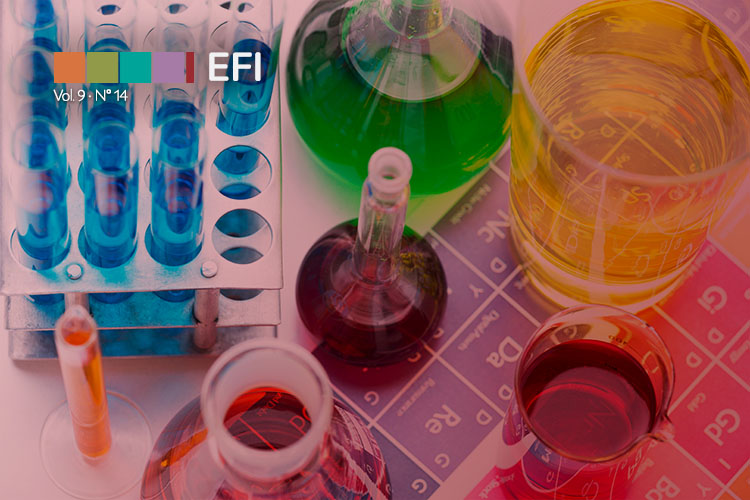Participatory action research in chemistry teacher training
Methodological aspects for the planning of a didactic itinerary
Keywords:
Action research, Chemistry teaching, Chemistry teacher training, Collective work, Didactic itineraryAbstract
Teaching Chemistry to initial teachers training is a complex task that requires the development of training proposals that consider the approach to the products and processes of the discipline (Furman and Podestá, 2019), from didactic approaches that allow future teachers to build knowledge of Chemistry for teaching at the secondary level (Córdoba, 2015).
This article presents the way made by teachers from Higher Teacher Training Institutes dependent on the General Directorate of Higher Education and the Faculty of Exact Physical and Natural Sciences of the National University of Córdoba, within the framework of a Participatory Action Research (IAP) of an inter-institutional nature, for the design of a didactic pedagogical itinerary (IPD) and its implementation in the curricular unit of Experimental Work in Natural Sciences of the Secondary Education Teachers in Chemistry.
The development of the IAP project contemplates the three moments in which teaching is organized: the preactive, the interactive and the postactive (Jackson, 1992). Each one is characterized by consensual decisions and actions for the definition of the methodological aspects of the research, the theoretical frameworks of reference, the didactic approach and the stations that made up the IPD, around the construction of knowledge about the “Dissolutions” for your teaching.
References
Anijovich, R.; Cappelletti, G.; Mora, S.; Sabelli, M. J. (2018). Transitar la formación pedagógica: dispositivos y estrategias. Buenos Aires: Paidós.
Córdoba. Dirección General de Educación Superior. Ministerio de Educación. (2015). Diseño Curricular del Profesorado de Educación Secundaria en Química.
Córdoba. Dirección General de Educación Superior. Ministerio de Educación (2021). Orientaciones para construir un itinerario pedagógico-didáctico. Programa de Formación Docente Inicial en Modalidad Combinada, ProFoDi – MC.
Furió Más, C. (2006). La motivación de los estudiantes y la enseñanza de la química. Una cuestión controvertida. Educación Química, 17, 222-227.
Furman, M.; Gellon, G.; Rosenvasser Feher, E.; Golombek, D. (2018). La ciencia en el aula. Lo que nos dice la ciencia sobre cómo enseñarla. Buenos Aires: Siglo XXI.
Furman, M.; Podestá, M. E. (2019). La aventura de enseñar Ciencias Naturales. Buenos Aires: Aique.
Furman, M.; Larsen, M. E. y Giorgi, P. (2020). ¿Cuáles son las mejores estrategias para la formación de docentes en ejercicio? Documento N.º 12. Las preguntas educativas: ¿qué sabemos de educación? Buenos Aires: CIAESA.
Gil Pérez, D.; Furió Más, C.; Valdés, P.; Salinas, J.; Martínez-Torregrosa, J.; Guisasola, J.; González, E.; Dumas-Carré, A.; Goffard, M.; Pessoa de Carvalho, A. (1999). ¿Tiene sentido seguir distinguiendo entre aprendizaje de conceptos, resolución de problemas de lápiz y papel y realización de prácticas de laboratorio? Enseñanza de las ciencias, 17 (2), 311-320.
Jackson, P. (1992). La vida en las aulas. Madrid: Ediciones Morata.
Latorre, A. (2003). La investigación acción. La investigación acción. Conocer y cambiar la práctica educativa. Barcelona: GRAÓ.
León Manchego, O.; Salcedo Torres, L. E. (2009). El problema de la desarticulación de conocimientos en la formación inicial de profesores de Química. Pedagogía y Saberes, 32, 35-42.
López Rivilli, M. J.; Becherán, C.; Páez, L.; Toranzo, E.; Masullo, M. (2022). Los trabajos prácticos en las clases de Química del profesorado. Un análisis didáctico. EFI, Educación Formación Investigación, 8 (13), 48-63.
Lorenzo, M. G. (2012). Los formadores de profesores: el desafío de enseñar enseñando. Profesorado. Revista de Curriculum y formación del profesorado, 16 (2), 343-360.
Luft, J. A. (2001). Changing inquiry practices and beliefs: the impact of an inquiry based professional development programme on beginnig and experienced secondary science teachers. Internacional Journal of Science Education, 23 (5), 517-534.
Mellado Jiménez, V.; González Bravo, T. (2000). La formación inicial del profesorado de Ciencias Experimentales. En J. Perales y P. Cañal, Didáctica de las Ciencias Experimentales. Alcoy: Marfil.
Ravela, P.; Picaroni, B.; Loureiro, G. (2017). ¿Cómo mejorar la evaluación en el aula? Montevideo: Grupo Magro Editores.
Shulman, L. (1986). Those who understand: Knowledge growth in teaching. Educational Researcher, 15 (2), 4-14.
Shulman, L. (2005). Conocimiento y enseñanza: fundamentos de la nueva reforma. Profesorado. Revista de currículum y formación del profesorado, 9 (2), 1-30.
Talanquer, V. (2004). Formación docente: ¿Qué conocimiento distingue a los buenos maestros de química? Educación Química, 15 (1), 52-58.
Vázquez Bernal, B.; Jiménez Pérez, R.; Mellado Jiménez, V. (2010) Los obstáculos para el desarrollo profesional de una profesora de enseñanza secundaria en Ciencias Experimentales. Enseñanza de las Ciencias, 28 (3), 417-432.

Downloads
Published
Issue
Section
License

This work is licensed under a Creative Commons Attribution-NonCommercial-ShareAlike 4.0 International License.
Atribución No Comercial Compartir Igual (by-nc-sa):
No se permitirá un uso comercial de la obra original, ni de las posibles obras derivadas, la distribución de las cuales se debe hacer con una licencia igual a la que regula la obra original.






